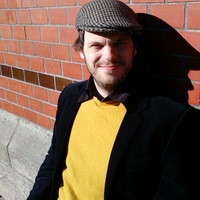- Philosophy of Cognitive Science, Situated Cognition, Distributed Cognition, Embodied Cognitive Science, Embodied Cognition, Embodied and Enactive Cognition, and 28 moreEnactive cognition, Enactivism, Extended Mind, Extended Cognition, Philosophy of Neuroscience, Critical Neuroscience, Philosophy of Biology, Philosophy of Mind, Philosophy of Action, Philosophy of Pseudoscience, Philosophical Anthropology, Phenomenology, Naturalism, Speculative Realism, Feminist Philosophy, Spinoza, Friedrich Nietzsche, Henri Bergson, Merleau-Ponty, Maurice Merleau-Ponty, Georges Canguilhem, Gilles Deleuze, Michel Foucault, Quentin Meillassoux, Ray Brassier, Alva Noe, Embodiment, and Cognitive Scienceedit
In a recent article published in Body & Society, Nikolas Rose considers what he takes to be possible historical-ontological implications of recent developments in brain-decoding technologies. He argues that such technologies embody the... more
In a recent article published in Body & Society, Nikolas Rose considers what he takes to be possible historical-ontological implications of recent developments in brain-decoding technologies. He argues that such technologies embody the premise that the brain is the real locus of mental states and processes, hence that a new materialist ontology of thought may be in the process of emerging through technological demonstration rather than through philosophical resolution. In this reply, I offer some reasons for being sceptical about such claims. I argue that the ontology in question hardly amounts to anything particularly new, that technologies cannot demonstrate anything in these matters independently of philosophical inclinations of some kind, and that it is at least an open issue whether the ontology in question can secure its claim to be a materialist ontology of thought.
Research Interests:
SAMMENDRAG: Gjennom de siste ti-femten årene har Deleuze oftere og oftere blitt gjenstand for en form for nylesning der det handler om å peke på en ikke-vedstått gjeld til fenomenologien i Deleuze. Den representanten for den... more
SAMMENDRAG: Gjennom de siste ti-femten årene har Deleuze oftere og oftere blitt gjenstand for en form for nylesning der det handler om å peke på en ikke-vedstått gjeld til fenomenologien i Deleuze. Den representanten for den fenomenologiske tradisjonen som kanskje oftest har blitt trukket fram som en forløper for mange av Deleuzes ansatser er Merleau-Ponty. Merleau-Ponty, hevdes det, må i større grad anerkjennes som Deleuzes allierte når det gjelder oppgaven med å tenke immanensen og forskjellen. I denne artikkelen forsøker jeg å vise hvorfor et slikt prosjekt har lite for seg. Strategien min er å ta for meg to filosofiske grunnspørsmål som reises og besvares hos både Deleuze og Merleau-Ponty, nemlig metafilosofi (spørsmålet om filosofiens bestemmelse) og metapsykologi (subjektteori). Med henvisning til sentrale og velkjente tekster fra begge forfattere søker jeg å vise hvordan de to inntar nærmest diametralt motsatte holdninger i disse to sentrale filosofiske spørsmålene. Hermed vil jeg mane til besinnelse hos dem som vil ha i både pose og sekk og som søker en fenomenologisert Deleuze eller en deleuzianisert fenomenologi.
Research Interests:
In this article, I propose to look at some recently advanced arguments that in different ways, and at varying levels of explicitness, oppose the idea and the ambition of a naturalized phenomenology. I consider three arguments in... more
In this article, I propose to look at some recently advanced arguments that in different ways, and at varying levels of explicitness, oppose the idea and the ambition of a naturalized phenomenology. I consider three arguments in particular: 1) taking phenomenology seriously should keep one from any attempt to get a purchase on the “hard problem” of consciousness, i.e., of explaining why an assembly of neurons or other physico-biological structure should yield phenomenal consciousness in the first place; 2) failure to adopt the transcendental point of view and methodology appropriate to the understanding of figures within classical phenomenology (like Merleau-Ponty) results in a misunderstanding of their genuine contribution to modern philosophy of mind; and 3) the misunderstanding in question has to do with the description deficit that inescapably compromises any attempt to characterize consciousness from a non-transcendental point of view. I argue that the reasoning behind these arguments fails to make adequate sense of either phenomenology or naturalism. A strategy is proposed by which an ambitious phenomenological philosophy can make peace with a no less ambitious cognitive (neuro)science, through a deflated notion of phenomenology as a domain of inquiry, combined with a re-inflated notion of Phenomenology as a philosophical orientation or movement.
Research Interests:
In this article, I attempt to accomplish two objectives. The first is a diagnosis of our contemporary understanding of nature, which I propose to characterize (borrowing a term from Merleau-Ponty) as an ontological diplopia between the... more
In this article, I attempt to accomplish two objectives. The first is a diagnosis of our contemporary understanding of nature, which I propose to characterize (borrowing a term from Merleau-Ponty) as an ontological diplopia between the view of nature as rigidity and the view of nature as plasticity. Second, I suggest a way to address this situation that combines basic clues from what I call Merleau-Ponty’s philosophy of the organism, as it can be gleaned from his book The Structure of Behaviour, and Terrence W. Deacon’s autogenetic model of the emergence of life from matter, such as it is set forth in his recent book Incomplete Nature: How Mind Emerged From Matter. I end with some thoughts on how this assemblage of a dialectical conception of the organism and an autogenetic theory of life’s emergence from non-life might enable a reconsideration of the stakes involved in the subversion of rigidity at the hand of plasticity that is underway in our times.
